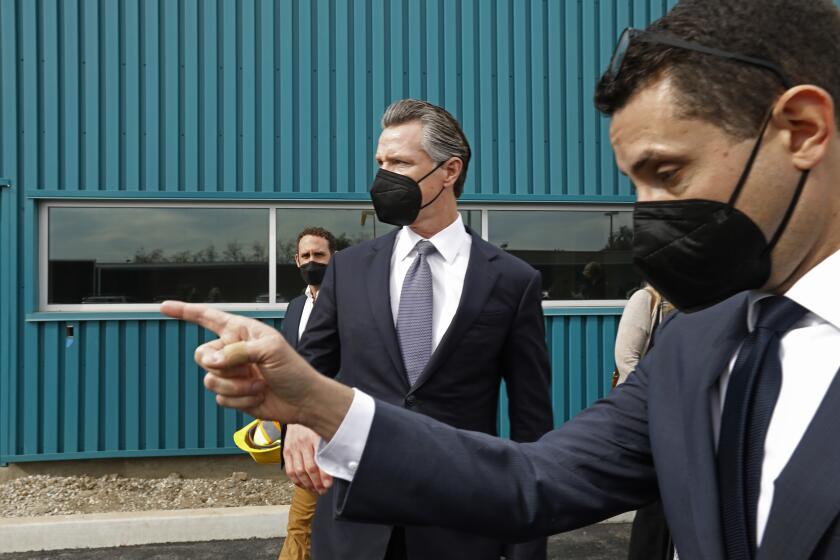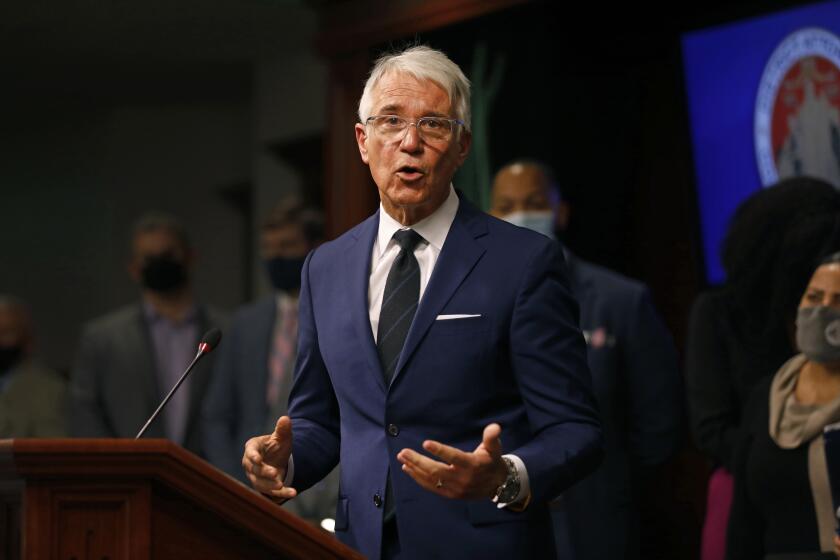Why crime is at the center of California elections this year

- Share via
SACRAMENTO — A little-seen attack ad roasting state Atty. Gen. Rob Bonta as an “anticop politician” may be just a blip in the social media universe, but it serves as a flashing neon sign warning Democrats what to expect in California’s election season.
“How can someone who cares more about criminals’ rights than victims’ rights, and is routinely at odds with law enforcement, serve as our state’s top cop?” the ad says. “It’s time for a change.”
The criticism comes from an independent political committee backing attorney general candidate Anne Marie Schubert, the Republican-turned-independent district attorney of Sacramento County. The ad also takes a swipe at Gov. Gavin Newsom, who faces a similar barrage from the right in his run for reelection for promising to close two prisons, imposing a moratorium on the death penalty and appointing Bonta as the state’s top cop.
After more than a decade hovering near the back burner of voter concerns in California, fear over crime has risen to the fore as Republicans seize on the issue to skewer Democrats from the state Capitol to the White House. Republicans are demanding an end to liberal policies that replaced some of the tough-on-crime laws of the 1980s and 1990s enacted under GOP Govs. George Deukmejian and Pete Wilson.
The political calculus is clear. Two-thirds of registered voters in California believe crime has risen in their neighborhoods, according to a recent UC Berkeley Institute of Governmental Studies poll co-sponsored by the Los Angeles Times. Just over half of voters surveyed said Newsom is doing a poor job on crime and public safety, up 16 percentage points from 2020.
Fifty-nine percent of voters said they would support changing the law to potentially allow for more felony prosecutions.
Those perceptions have largely been driven by television news coverage of a series of coordinated “smash and grab” thefts. Auto burglaries and stolen cars are also driving increases in crime in major cities, according to a January study by the nonpartisan Public Policy Institute of California.
Republican political consultant David Gilliard said crime is an issue that California Democrats “own” after convincing voters to expand options for the early release of tens of thousands of incarcerated people and reduce the punishment for many convicted of theft and other nonviolent offenses.
Proposition 47, the 2014 voter-approved ballot measure that Newsom supported, reclassified some felony drug and theft offenses as misdemeanors and raised from $400 to $950 the amount for which theft can be prosecuted as a felony. Two years later, California voters approved Proposition 57, a parole overhaul measure that increased good-behavior credits, allowing prisoners to be released earlier.
“When you have fewer people who are criminals in prison, that means there’s more of them on the street. That means crime goes up. It’s a pretty easy equation for voters to understand,” Gilliard said.
Concerns about rising crime and the homelessness crisis emerged as the top issues driving voter dissatisfaction with Gov. Gavin Newsom.
Recall efforts are underway against progressive district attorneys in two of California’s most liberal counties. An effort to oust San Francisco Dist. Atty. Chesa Boudin — one San Francisco Mayor London Breed hinted she might support — will be on the June ballot. Another recall effort, targeting L.A. County Dist. Atty. George Gascón, is becoming a pivotal dividing line in the L.A. mayor’s race.
Republicans in Sacramento are leaning on the impact of Proposition 47 to crystalize their political message.
Assembly Member Kevin Kiley (R-Rocklin), who is running for Congress in a solidly Republican district, called Proposition 47 a “failed policy” that has inflicted “disastrous consequences” on Californians. He and more than a dozen other Republican legislators have introduced Assembly Bill 1599 to repeal the law — a mostly symbolic gesture in a Legislature controlled by Democrats.
“I believe Californians are fed up with this sort of lawlessness,” Kiley said. “They are ready to have a rational public safety policy again.”
It appears the most potent foil in the Los Angeles mayor’s race is Dist. Atty. George Gascón.
Some prominent Republican leaders conveyed a different message just seven years ago, when tough-on-crime rhetoric began melting away in some parts of the country.
In 2014, Republican Sen. Rand Paul of Kentucky and former Republican House Speaker Newt Gingrich urged California voters to pass Proposition 47. In an Orange County Register opinion article, Paul argued that America needed to change its criminal justice system because it “drains tax dollars, destabilizes families and, worse, isn’t making us any safer.”
That same year, then-Texas Gov. Rick Perry bragged about shutting down a correctional facility following the state’s use of drug courts to divert addicts into treatment.
“You want to talk about real conservative governance. Shut prisons down. Save that money,” Perry told the audience at the 2014 Conservative Political Action Conference.
But Paul and Perry’s comments came at a time when crime rates were near record lows in many parts of the country, and voter concerns were focused elsewhere.
Democratic consultant Andrew Acosta said today’s voters are angry about a multitude of issues affecting their day-to-day lives — crime among them — and candidates from his party would be wise to take that seriously.
“Housing, crime — those are the issues. Then you sprinkle in the inflation piece,” Acosta said. “What does this all look like in November? I don’t know, but right now, it could be a bit of a toxic brew.”
Assembly Member Al Muratsuchi (D-Rolling Hills Estates), a former prosecutor with the state Department of Justice, is supporting legislation this year to roll back provisions of Proposition 47, including a bill to return the threshold for felony theft to $400.
“The Legislature needs to be responsive to the will of the people,” Muratsuchi said. “The Berkeley poll clearly shows that more and more Californians are increasingly concerned about the direction that we’ve been heading [in], and now maybe is the time for us to take, if not a course correction, at the very least some course modification.”
Assembly Member Reggie Jones-Sawyer (D-Los Angeles), chair of the Committee on Public Safety, said he favors taking a more measured approach rather than bending to the politics of the moment. Any effort to roll back Proposition 47 must be accompanied by data to demonstrate why the changes are needed and to show that they’re not “fear-based,” he said.
Jones-Sawyer said there is widespread misunderstanding of Proposition 47, which makes it vulnerable to criticism. He said there has to be greater collaboration between criminal justice advocates and law enforcement, likening the two sides to “arguing parents in a divorce.”
“When we are arguing, it becomes a battlefield. And the only people who suffer are the people we are supposed to be taking care of,” he said.
Jones-Sawyer introduced a bill this year to give law enforcement more power to arrest people involved in organized retail and smash-and-grab theft.
Fresno County Sheriff Margaret Mims said the rise in violent crime, and increasing concerns among voters, was predictable. Property crimes have become so rampant that more businesses and residents see no reason to report thefts, she said.
“We’re being overwhelmed, because criminals seem to be more emboldened,” Mims said. “I think that’s because of the messages being sent from Sacramento, unfortunately, and with Prop. 47.”
Defenders of Proposition 47 note that, according to the California Department of Justice, property crime has been on a steady decline statewide since the law was enacted — at least through 2020, the most current figures available.
Roughly 30 states have increased the threshold for felony theft offenses since 2005, according to the National Conference of State Legislatures. More than half of all states have a felony theft threshold of $1,000 or more.
“For years, law enforcement in California has been telling people that Proposition 47 is contributing to an increase in crime,” said Anne Irwin, founder and director of Smart Justice California, which advocates for criminal justice reform. “Law enforcement was spreading this misinformation even when crime in California was across the board at all-time historic lows.”
UC Irvine criminology professor Elliott Currie says property crime statistics are notoriously unreliable — even before the passage of Proposition 47 — because many incidents are not reported. He noted that during the pandemic, violent crime — particularly murder — has been on the rise across the nation.
“It’s taking place in all different kinds of places: red states, blue states and such. You try to attribute that to California criminal justice reforms, you’re clearly barking up the wrong tree,” Currie said. “It’s just a Republican talking point at the moment.”
The sharp increase in homicides during the pandemic is more clear-cut, Currie said. Nationwide, the murder rate surged by nearly 30% from 2019 to 2020, with California seeing a slightly higher increase, according to the U.S. Centers for Disease Control and the state Department of Justice. Montana, South Dakota and Kentucky saw some of the largest increases, as did New York, Pennsylvania and Illinois.
Candidates in some of California’s divisive political races are making the increase in homicides a centerpiece of their pitch to voters this year.
Republican gubernatorial candidate Brian Dahle, a state senator from Northern California, blamed the rise in murders on the policies of “elites liberals.” Brian Marvel, president of the Peace Officers Research Assn. of California, said the state’s progressive policies on crime have “cost us lives and created many more victims” when he announced his organization’s endorsement of Schubert for attorney general on Tuesday.
But Newsom and Bonta have signaled their intent to use fear of gun violence in a new line of attack on the firearms industry. The Democrats argue that gun rights advocates and gun makers have seeded the increase in violent crime through the proliferation of weapons across the country. The two appeared together at a February news conference in Del Mar to throw their support behind legislation to enable Californians to sue gun manufacturers and distributors.
Throughout his first three years in office, Newsom has defended the progressive policies on crime that have been adopted over the last decade, including bans on assault weapons and measures aimed at reducing recidivism through educational opportunities and mental health programs.
“We’re not walking back on our commitment in the state to advance comprehensive reforms. We’re not walking back in this state to right the wrongs of the past,” Newsom said in December.
More to Read
Sign up for Essential California
The most important California stories and recommendations in your inbox every morning.
You may occasionally receive promotional content from the Los Angeles Times.















